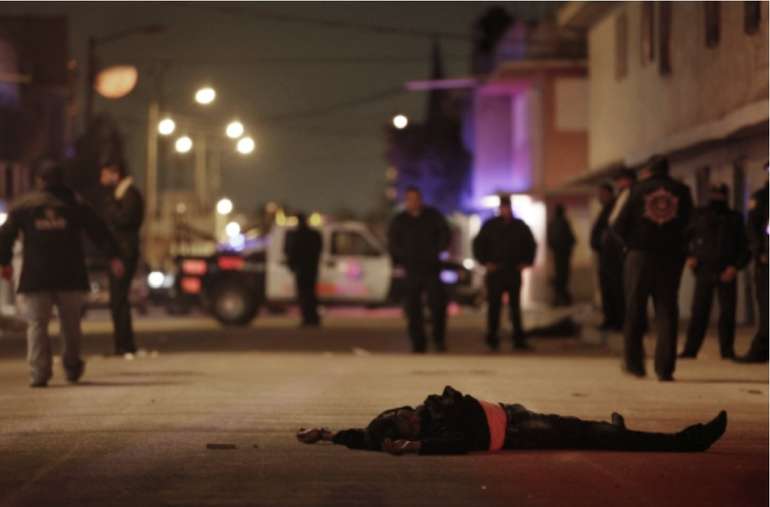By Tjen Folket, 25.04.2016.
What is a revolutionary answer to gang problems?
This is one of several texts related to the parole: “Fight back against oppression! Smash the power’s individualism and garbage culture!”. The text was published in conjunction with May 1.
Where there are people, there is community. Even under capitalism, a number of communities arise, both within the framework of the system–and outside of it. Everything from motorcycle clubs to religious sects are examples of the social communities that often establish themselves on the fringes of society.
Gangs are an example of this. It usually starts with cliques of young boys that meet in school or are neighbors. Gangs of friends are nothing new, and are not necessarily negative. That people hang out together and create strong friendships is very positive. It is not only a good thing, but necessary to deal with day-to-day issues.
However, some of these gangs grow and become something more than friendships. In some cases, these gangs begin to hang out around criminals and dominate other people. In poor areas of the USA, gangs like these have developed impressive structure and cultures for decades. Gangs become a way out of poverty for many, or they become a form of protection in a society where the social structure has collapsed, or they become alternative families, for those who have dysfunctional home lives and where the family is the only social safety net. Gangs like this can become clans where the state is weak. They always have some common themes: the gang comes before anything else, the gang’s honor is extremely important, loyalty to the gang is the most important thing—and patriarchal structure is extremely strong. Gang culture is mainly a masculine culture and many gangs usually treat women as objects.
Gangs can grow and be idolized by parts of popular culture, for instance by a lot of hip-hop artists. But is this radical and good? Are gangs a positive rebellion against the state and the system? We believe that they are not.
A gang of people who take care of each other and help others in the neighborhood are of course good. But this is not how criminal gangs operate. On the contrary, such gangs live like parasites in a victimized community. Their violence is usually directed towards other gangs, or random people in their school or neighborhood. Their criminality usually harms poor people far more often than rich people. The terror and negativity they spread harm neither police nor the system, but completely normal people.
Revolutionaries want to organize people’s power and we want to organize the poorest working class neighborhoods in particular. Many of the people we want to organize can easily end up in gangs. But criminal drug gangs are not our friends. Historically, such gangs have taken arms against revolutionaries. In Shanghai, China communists were massacred by the criminal triads in the 1920s. There is no reason to ally ourselves with these people simply because we have a “common enemy” (police and the state).
If revolutionaries wish to organize in neighborhoods affected by gangs, they must build a positive alternative to gangs. People with experience in gangs can be good allies in improving and helping youth with their problems. Without an alternative, we will not succeed. People who need community will look for it, no matter what others say. Therefore, it would be hopeless to try to get people to leave gangs without offering an alternative.
If one wants to organize in these neighborhoods, you must be able to work towards people’s safety. One must create an environment where people are safe from assault. It can be extremely dangerous. In Sicily, the Italian communists were often attacked by the mafia. A number of communists were killed on mafia orders. In Northern Ireland, there have been firefights between the IRA and criminal drug gangs in republican neighborhoods.
Norway is neither Sicily nor Los Angeles. It is a calm country. Nonetheless, gangs exist here too. Both criminal gangs that have been active for decades and the seeds of new gangs made up for very young boys. Most of these seeds will never grow, but it can still be a bother for those who become their victims.
A political answer to gang problems cannot be naïve. One cannot explain them away as a normal part of society, since they are their own subculture. They are a part of society, but they move at the outskirts and operate with their own norms. Red and radical policies have their own particular responsibility for finding good answers to problems, since we are against the state and police and can therefore not simply call for “law and order”. We cannot just hand the problem off to others to find solutions to these problems if we want to remain trustworthy in the eyes of the communities they prey upon.
Our answer for now is that people who have formerly been in gangs can do important work for helping people get out. We need good alternatives—music scenes, clubs, sports and social communities that can give people a positive outlook.
Kjære leser!
Tjen Folket Media trenger din støtte. Vi får selvsagt ingen pressestøtte eller noen hjelp fra rike kapitalister slik som rasistiske “alternative medier”. All vår støtte kommer fra våre lesere og fra den revolusjonære bevegelsen. Vi er dypt takknemlige for dette. Vi overlever ikke uten, og du kan gjøre ditt bidrag ved å støtte oss med det du kan avse.
